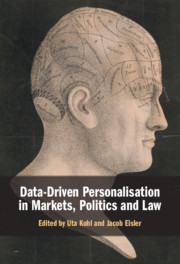Book contents
- Data-Driven Personalisation in Markets, Politics and Law
- Data-Driven Personalisation in Markets, Politics and Law
- Copyright page
- Contents
- Figures
- Tables
- Contributors
- Preface
- Part I Introduction: Theoretical Perspectives
- 1 The Pixelated Person: Humanity in the Grip of Algorithmic Personalisation
- 2 Personalisation and Digital Modernity: Deconstructing the Myths of the Subjunctive World
- 3 Personalisation, Power and the Datafied Subject
- 4 Personal Data and Collective Value: Data-Driven Personalisation as Network Effect
- Part II Themes: Personal Autonomy, Market Choices and the Presumption of Innocence
- Part III Applications: From Personalised Medicine and Pricing to Political Micro-Targeting
- Part IV The Future of Personalisation: Algorithmic Foretelling and Its Limits
- Index
4 - Personal Data and Collective Value: Data-Driven Personalisation as Network Effect
from Part I - Introduction: Theoretical Perspectives
Published online by Cambridge University Press: 09 July 2021
- Data-Driven Personalisation in Markets, Politics and Law
- Data-Driven Personalisation in Markets, Politics and Law
- Copyright page
- Contents
- Figures
- Tables
- Contributors
- Preface
- Part I Introduction: Theoretical Perspectives
- 1 The Pixelated Person: Humanity in the Grip of Algorithmic Personalisation
- 2 Personalisation and Digital Modernity: Deconstructing the Myths of the Subjunctive World
- 3 Personalisation, Power and the Datafied Subject
- 4 Personal Data and Collective Value: Data-Driven Personalisation as Network Effect
- Part II Themes: Personal Autonomy, Market Choices and the Presumption of Innocence
- Part III Applications: From Personalised Medicine and Pricing to Political Micro-Targeting
- Part IV The Future of Personalisation: Algorithmic Foretelling and Its Limits
- Index
Summary
Over recent years, economists, lawyers and regulators have become increasingly interested in the role played by ‘network effects’ in the digital economy: namely, the phenomenon whereby a platform becomes increasingly valuable to its users, the more users it succeeds in recruiting. Whether user-generated content on Youtube and Facebook, proprietorial messaging services such as Whatsapp, or two-sided markets such as Uber and Airbnb, it is now widely recognised that many of today’s most successful technology businesses enjoy a dominance based upon achieving a critical mass of users, which makes it near-impossible for less well-used platforms to compete. What is less widely recognised is that data-driven personalisation operates in a comparable (albeit not identical) manner: as the volume of users increases, personalisation becomes ever more sophisticated, generating a ‘second-order’ network effect that can also have significant implications for the viability of competition. This paper unpacks the distinction between first-order and second-order network effects, showing how both can create significant barriers to competition. It analyses what second-order network effects imply for how governments can and should regulate data-driven personalisation, and how states might help their citizens to regain control over the value that they create.
- Type
- Chapter
- Information
- Data-Driven Personalisation in Markets, Politics and Law , pp. 74 - 92Publisher: Cambridge University PressPrint publication year: 2021
- 2
- Cited by

